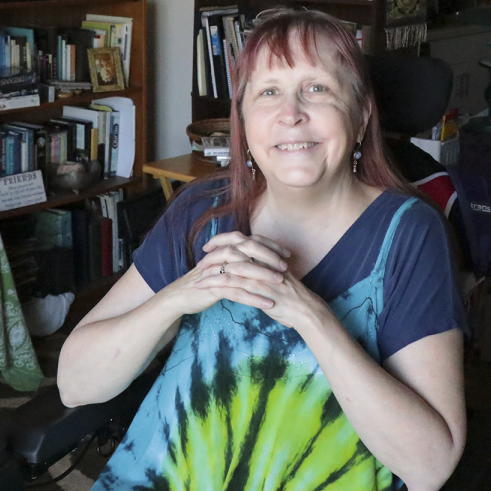A Rolling Perspective: “Lost Connection To Server”

It took but two weeks this last chilly November—car-less, in need of heat and food, and newly arrived in the rural town that had housing for me—to learn that internet does not have the connecting power I thought it did. I remember checking my phone repeatedly and in vain for even one bar so I could at least call someone even if I couldn’t use the internet, but all I saw was the message, “Lost connection to server.” Indeed.
My adventure came about because I moved, but the story is relevant even if you’ve no plans to relocate. For one, the harsh reality for renters in cities with booming economies is that you are in danger of rent hikes that can render you homeless, which is what happened to me. When a property is sold, or your landlord caves in to his desire to make the same insane money as other landlords, you’re out. If you are disabled or elderly, it’s even worse.
Perhaps as a homeowner you feel safe from homelessness, but are you happy with, say, your current internet provider? Insurance company? Did you know you can change them? That you can negotiate new contracts and get different, less expensive, and better service? You won’t find these deals on the internet. They require the personal touch.
Back to my cold new home. I knew (or thought I knew) I’d be hard-pressed to get any services set up, or benefits such as food stamps, unless I had internet. That had been my experience in the multiple moves I’d made since utilities and communications businesses started offering their services online. Comcast Xfinity does not serve my rural area, though, so I had no internet.
Ever resourceful, I thought, “No worries! I’ll just use my phone to get set up.” Feeling pretty smart, I pulled out my new H20 SIM card with its promise of data. Oh, dear. The card didn’t fit despite the package’s claims, but that wasn’t the biggest problem. After reading the fine print inside, I saw I needed the internet to set up the phone. Really?! (Does anyone else see the irony of needing an internet connection before you can get internet service?)
The next day I took the bus to the library, but they’d lost internet too. (I’ve since learned this is a common occurrence.) Fortunately, the library doesn’t rely solely on internet. They stock such artifacts as actual phone books, and they’re staffed with super-helpful, knowledgeable librarians. I highly recommend visiting this magical place where they have not lost connection with the people they serve.
When did “service” costs get so regressive anyway? SNAP, TANF, Medicaid, and Social Security Disability: they insist we use the internet to access them yet, just like food and gasoline, internet access costs proportionately more for those at the bottom of the economic scale. If institutions want disabled, older, and low-income citizens to use the internet, then access to it should be truly free, and getting to this centralized place should not pose a problem for the mobility impaired. Yet, unless a community has a vibrant Dial-A-Ride or town bus service (as mine does), disabled persons find it nearly impossible. Online and automated phone systems baffle users to the point that they either give up, or choose to brave ridiculously long lines and visit offices in person. People are not getting the benefits to which they’re entitled precisely because the process is so daunting.
Using automated systems to address human issues falls short because we are not machines. Their questions are written for the general public, not specific members. Further, the college-educated question-writers and website designers, whose first language is probably English, may have never used services like food stamps or Medicaid. It strikes me that whoever controls the questions also controls the answers, and institutions want that control. All too often, we give it to them.
Unless we wait in over-lit, over-warm places to state our case face-to-face. Every time I’ve done so, I’m awed by these social services workers. I would never be able to remember—let alone bilingually share—the ins and outs of even one program. To say they are overworked is an understatement. Yet as institutions increase their dependence on robotic systems, these valuable employees are let go, while the workload increases for those who remain.
It’s different in my new town though, and it gives me hope. For instance, the person who could set up my electricity account actually answered the phone. I was floored. They don’t allow people to set up service via the internet. Hmm.
I discovered other businesses here operate likewise. Because of the high per capita homeless and disabled persons rate, they assume people don’t have internet access or a smart phone. Their personal approach empowers and dignifies both vendor and consumer. It also guarantees jobs stay in the community and are not deleted in favor of frustrating, inflexible automated and online systems, or overseas customer service personnel.
Isn’t it amazing? I’m more connected without internet than with it. Our society’s dependence on a faceless, soulless, and expensive medium means we lose life-affirming, human connections. Try reaching out the old-fashioned way first. And if you’re unhappy with any aspect of your life, don’t just succumb. Ask new questions to create answers that better suit you or your mobility-impaired loved one.
What Can You Do?
- Libraries are made for this. If they can’t help you, they know who can.
- Know what you can afford—and stick to it. Salespeople are trained to tempt, but their deals are disasters if you can’t afford to buy food because of them. Remember too: their “free” is never, EVER, free.
- Get up close and personal. If enough people choose this, companies will hire more local staff. And if talking to outsourced teams bothers you, then stop using them. Find local agents and see what real customer service looks like.
- Any volunteers? Programs like Dial-a-Ride need you. If your community doesn’t have low-cost transport for its elderly, disabled, or poor citizens, start it yourself!
Jennifer Holland taught herself to read and write at age four and has been doing both ever since. Minnesota-born and Wisconsin-bred, she nonetheless inherited the Irish perchant for travel. Despite the shoestring budget, she visited a dozen countries before her diff-ablement, and even lived in Ireland for nearly fifteen years. Her encounters with other cultures inform the quirky insights into human behavior that find their expression in her poetry, novels, and non-fiction works. When she's not reading or writing, she enjoys chair yoga, video chats with her children and gradchildren, and living happily with MS on a tiny fixed income.


